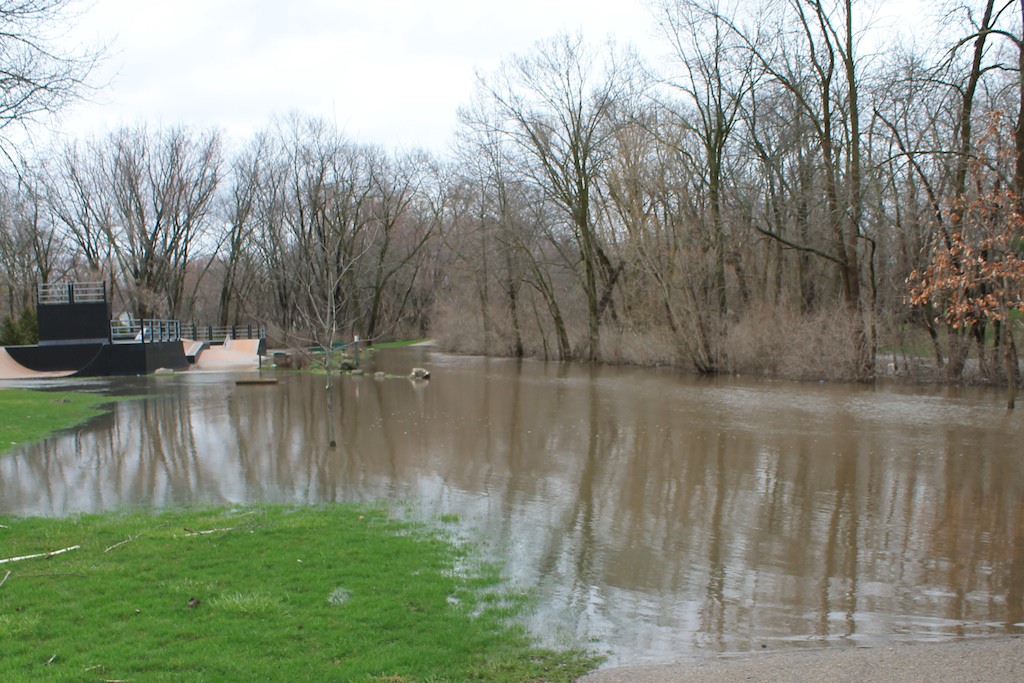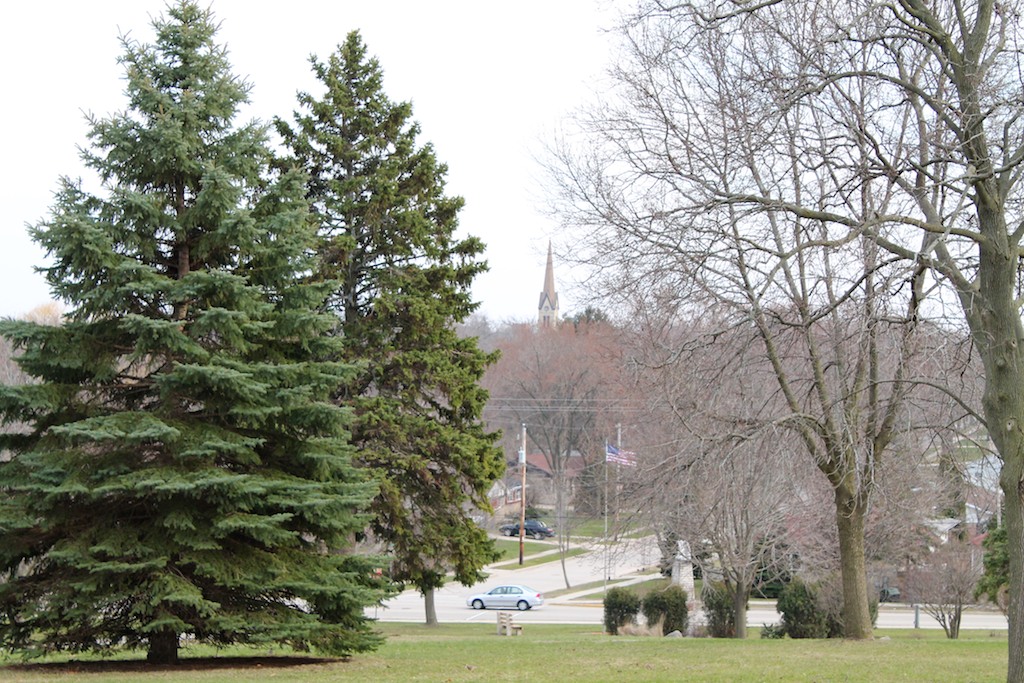Monthly Archives: April 2013
Public Meetings
Downtown Whitewater Design Committee
by JOHN ADAMS • • Comments
Daily Bread
Daily Bread for 4.21.13
by JOHN ADAMS • • Comments
Good morning.
We’ll have a Sunday of cloudy skies, a one-in-five chance of afternoon rain, a high near fifty-two, and south winds at 10 to 15 mph.
The Hubble Space Telescope is twenty-three-years old. The European Space Agency recently recorded a video presentation with information on joint NASA and European Space Agency photographs of nebulae, particularly the Horsehead Nebula.
Remarkable.
Some updates on recent poll results —
Of Sphynx Cats, readers’ assessing their appearance picked elegant over evil glint by more than 2-1, 69.44 – 30.56%. Of illuminated beer bottles, in a close vote, Heineken’s proposed glowing bottle prevailed, with 51.16% saying Yes! and 48.84% saying Umm….no.
Google-a-Day asks a geography question: “What group of islands in the Pacific are part of the same volcanic zone and named from the Greek words meaning “small” and “island?”
Daily Bread
Daily Bread for 4.20.13
by JOHN ADAMS • • Comments
Good morning.
Saturday in Whitewater: mostly sunny, high of forty-four, light winds, 13h 37m of sunlight, 14h 37m of daylight, and a waxing gibbous moon.
It’s National Record Store Day, if you can find one. If you do find one, you may discover that vinyl may not be dead after all:

The LP has re-emerged as the music format of choice among hipsters and audiophiles, with sales soaring by nearly 18% to 4.6 million albums in 2012, according to Nielsen Soundscan. (Just two decades ago, sales were down to 300,000.) But before you join the bandwagon — April 20 is National Record Store Day, after all — you’ll need a turntable.
Continuum, an Australian audio brand, suggests its $160,000 Caliburn model — a record player that it bills as “something beyond the state-of-the-art.” In layman’s terms, that means everything about the turntable is designed with stability in mind — the fewer vibrations, the better the sound. The stand, for instance, is “precision-machined in aircraft-grade aluminum” and incorporates a “floating platform.” Its oddly shaped tonearm promises “infinite stiffness with lowest mass.” And its “platter” — that’s where the LP sits — is 80 pounds, and driven by a specially built motor that makes use of the same technology employed by the U.S. military “for select advanced motion-control systems.”
It is beautiful, but digital is vastly more convenient, however heretical that must sound to an audiophile.
On this day in 1836, Wisconsin’s oldest library:
1836 – Oldest Library in the State Founded
On this date an Act of Congress created the Territory of Wisconsin and in the sixteenth and final section of that Act appropriated funds for the Wisconsin State Library to support the needs of the fledgling government. The library is still functioning but has been renamed as the Wisconsin State Law Library [Source: Wisconsin State Law Library]
From Google, a daily question on geography and air travel: “What active volcano in the U.S. poses a significant threat to air travel between North America and East Asia?”
Nature
Water
by JOHN ADAMS • • Comments
Cats
Friday Catblogging: The Bad Kitty Website
by JOHN ADAMS • • Comments
Frustrated cat owners (a.k.a. undeserving people without sufficient patience) now have a website where they can post photos of their cats: cat-shaming.tumblr.com.
There’s a curiosity about this, of course: most people would conclude that cats cannot read, and that these photos of cats posed with signs declaring their culpability for supposed misdeeds are intended only for human viewing. Perhaps. Alternatively, these owners (among a few others) may know that cats are far more intelligent than most have imagined, and that the photos are intelligible to the cats, themselves. Just another theory to mull on a rainy day.
Poll
Friday Poll: Illuminated Beer Bottles?
by JOHN ADAMS • • 6 Comments
Heineken is considering illuminated beer bottles, that glow when you toast or sip. Really (at least, I think really).
So, good idea?
I’ll say — no.
What do you think?
Daily Bread
Daily Bread for 4.19.13
by JOHN ADAMS • • 2 Comments
Good morning.
Our week ends with the possibility of rain or snow in the afternoon, with a high of forty-one.
Update: David, kindly commenting below, reminds me that I missed a crucial anniversary in American history. Yes, did I ever! On April 19, 1775, Americans fight the British at the Battles of Lexington and Concord, and a great revolution begins:
At about 5 a.m., 700 British troops, on a mission to capture Patriot leaders and seize a Patriot arsenal, march into Lexington to find 77 armed minutemen under Captain John Parker waiting for them on the town’s common green. British Major John Pitcairn ordered the outnumbered Patriots to disperse, and after a moment’s hesitation the Americans began to drift off the green. Suddenly, the “shot heard around the world” was fired from an undetermined gun, and a cloud of musket smoke soon covered the green. When the brief Battle of Lexington ended, eight Americans lay dead or dying and 10 others were wounded. Only one British soldier was injured, but the American Revolution had begun….
When the British troops reached Concord at about 7 a.m., they found themselves encircled by hundreds of armed Patriots. They managed to destroy the military supplies the Americans had collected but were soon advanced against by a gang of minutemen, who inflicted numerous casualties. Lieutenant Colonel Frances Smith, the overall commander of the British force, ordered his men to return to Boston without directly engaging the Americans. As the British retraced their 16-mile journey, their lines were constantly beset by Patriot marksmen firing at them Indian-style from behind trees, rocks, and stone walls. At Lexington, Captain Parker’s militia had its revenge, killing several British soldiers as the Red Coats hastily marched through his town. By the time the British finally reached the safety of Boston, nearly 300 British soldiers had been killed, wounded, or were missing in action. The Patriots suffered fewer than 100 casualties.
On this day in 1995, “a truck bomb exploded outside the Alfred P. Murrah Federal Building in Oklahoma City, killing 168 people and injuring 500. (Timothy McVeigh was later convicted of federal murder charges and executed.)”
On 4.19.1862, while fighting to preserve his country, Wisconsin’s governor dies:
1862 – Governor Harvey Drowns in the Tennessee River
On this date Governor Louis Harvey died while leading an expedition to relieve Wisconsin troops after the battle of Shiloh. The expedition was bringing doctors, nurses, and much-needed medical supplies to soldiers when Harvey, crossing from one steamboat to another, slipped, fell into the swift currents of the Tennessee River, and never re-surfaced. His body was recovered ten days later, nearly sixty miles downstream. When news reached Madison, Lieutenant Governor Edward Salomon was sworn in as Wisconsin’s first German-American governor. [Source: Wisconsin in the Civil War, by Frank L. Klement]
Google-a-Day asks a question about animals in Chicago: “As a testament to its adaptability in urban areas, what kind of animal strolled into a popular sandwich shop in the Chicago Loop area in the spring of 2007?” Follow up: What kind of sandwich did it order? I’d guess pastrami on rye, but that’s just speculation.
Uncategorized
Meanwhile, in Chicago…
by JOHN ADAMS • • Comments
Anderson, Cartoons & Comics
Evaluation
by JOHN ADAMS • • Comments
Daily Bread
Daily Bread for 4.18.13
by JOHN ADAMS • • Comments
Good morning.
Rain – we’ve had much of it, and we’ll have more today in Whitewater. The high will be about fifty-seven, with southeast winds at 5 to 10 mph. Total rainfall today may amount to between a half and three quarters of an inch. It’s a gift: rainy days are often among the most soothing.
Fishermen aren’t the only ones who’d like to catch a fish:
On 4.18.1818, we become part of another territory:
1818 – Wisconsin Becomes Part of Michigan Territory
On this date, the land encompassing current-day Wisconsin was made part of the Michigan Territory, representing one step in Wisconsin’s path to statehood. Wisconsin was a part of the Northwest Territory from July 13, 1787-May 11, 1800; the Indiana Territory from May 1800-February 3, 1809; and the Illinois Territory from February 3, 1809-April 18, 1818. The Territory of Wisconsin was formed July 4, 1836.
From Google-a-Day, a science question: “If you want to find the energy quantum of light, you multiply the frequency of the radiation (v) by ‘h.’ What is ‘h’?” Odd, but this doesn’t even seem like a serious question. The clever men and women of Google must know that h is the eight letter of the English alphabet…
Beautiful Whitewater
Beautiful Whitewater
by JOHN ADAMS • • Comments
Restaurant, Review
Restaurants: Quick Observations and Upcoming Reviews
by JOHN ADAMS • • Comments
I’ve upcoming reviews next Wednesday and the week thereafter of the Black Sheep and Randy’s Restaurant & Fun Hunter’s Brewery. I’ve completed both, but still each leaves me with points to consider, of establishments that are different in just about every way.
For today though, two observations about what matters for a restaurant or restaurant culture.
First, the near-obvious: unlike other businesses, patrons will frequent a restaurant with a dilapidated exterior if they find a pleasant atmosphere and good food inside. One will hear, sometimes, that a place is a ‘hole in the wall,’ but is still worth visiting.
My point isn’t that an establishment should be dilapidated, or that it doesn’t matter – it’s that good inside will overcome bad outside more powerfully for a restaurant than for another merchant.
Why is that? I’d say that a (good) restaurant, by its nature, offers an escape from one environment, for a complete experience (food, atmosphere, service, etc.) of another. There are few merchants that offer experiences so comprehensive as that of a restaurateur. When an establishment is good, that’s the kind of experience it offers.
Second, more restaurants benefit existing establishments whether patrons are coming from town or from nearby cities. One restaurant will not a culture make, either for those in a city or for patrons within driving distance. It might be beneficial to be the only cobbler; it’s not beneficial to be the only chef.
My friends from school often said that the ‘more one does, the more on can do.’ It’s not always true, but often – productive people become more productive.
Restaurants in a town like Whitewater have to ask themselves: will your patronage come from within the city, from beyond it, or a measure of both?
Boosting the number of restaurants in the city assures a community that acclimates to dining out more often, and an attractive destination for visitors from beyond Whitewater.
Anyone relying exclusively on Whitewater’s current level of restaurant patronage is dangerously imperiling his or her establishment’s future.
More means better.
City, Government Spending, Local Government
Common Council 4.16.13: Downtown Whitewater, Library
by JOHN ADAMS • • Comments
Representatives from Downtown Whitewater and the Public Library spoke last night.
A few remarks about each —
Downtown Whitewater. Two representatives from the DTWW Board, the president and vice-president of that body, addressed Council last night.
(1) Rush to vote. Two council members moved to vote on a understanding between the City of Whitewater and DTWW before City Manager Clapper advised that the agreement on which they would be voting had been modified (and he thereafter offered the most-recent version). A discussion of the latest draft then took place, as it should have, before a vote.
Still, no one owes a municipally-funded organization its last-minute scramble. (Part of the change was a provision to pay DTWW its $20,000 in public money in quarterly installments.) This information should have been in the packet, and should not have been addressed on 4.16. It’s fair to consider; it was not necessary to consider on 4.16.
(2) The Ex Officio. It’s more than helpful that a DTWW representative reminded Council that City Manager Clapper is on the DTWW board (as he is, of course). So when DTWW shares information with him, as he attends meetings or receives messages from board members, one can assume that he’ll share that information with the community.
(3) Taken for Granted. No one should take municipal funding for granted. That there is one memorandum of understanding does not mean our city should commit to another. In the end, whether DTWW merits funding for 2014 depends on (1) the benefits they show for the tens of thousands they’ve received, (2) the projects for which they’ll commit that new funding in 2014, (3) the needs of the city elsewhere, (4) the timeliness of their accounting and proposals.
One has a duty of care to the poor, the afflicted, and the distressed – there is no similar duty to fund a business or civic group. That’s all discretionary.
Council – and the public – deserve these documents with time to reflect and weigh the request.
(4) Fundraising. I understand the importance of fundraising. I’m not sure what to make of a cash-for-cash raffle. If the City of Whitewater wants to see fundraising from DTWW, does it matter to the city what kind of fundraising it is? If the city’s municipal manager is on the board of a business group, does he advocate a cash-for-cash scheme?
After all, would he (if it were even possible) advocate a City of Whitewater lottery? I’d say government doesn’t need to be in the lottery business – that’s a role for private, legal betting (for those so inclined).
I don’t care how DTWW raises its money; I care how DTWW uses public money while raising private money. I’d suggest that cash for cash isn’t particularly effective on this scale, but that would be a private matter were the organization not dependent on public money.
An expectation to fundraise makes sense; government cannot both give money and assign burdens without some responsibility for the result.
(5) Reports. Any organization requesting public money for 2014 should be prepared to submit (a) a detailed budget request in August and (b) a detailed account of its year-to-date activities, including use of public money received for 2013, by October 1st.
Ideally, it should be a full year’s report: Dr. Kidd’s right about wanting a solid, full-year report.
That, by the way, would be both good planning and true transparency.
But, in any event, state requirements or no state requirements, if an organization’s report is not at least year-to-date, a funding request should be rejected.
At budget season, one should expect to see clear and persuasive evidence of practical accomplishments in 2013.
DTWW board president Dave Saalsaa had it right to pledge to accommodate Council’s timetable; that’s a reasonable approach to the community. Anything else is quibbling.
The Library. There’s everything that’s been done, and there’s a construction project. The former may bolster the justification for the latter, but it needs to be an explicit, not merely implicit, justification.






